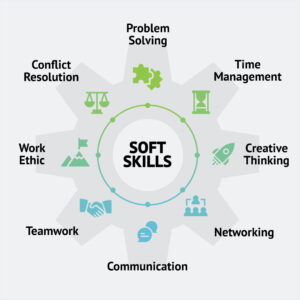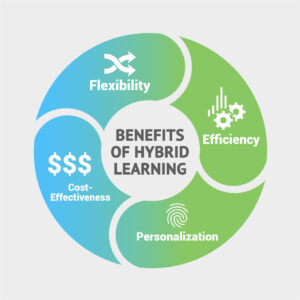Over the years, organizations have come to value soft skills more and more, while still struggling to measure and train around gaps in their workforce. And even those who recognize the importance may be reluctant to spend time and resources developing and implementing training. But what if the cost of not building soft skills in your organization is greater than providing meaningful training opportunities to employees over time? How can you create efficient and effective learning tools and sell the idea to your management team?
What are Soft Skills?
Soft skills are those that are not technical in nature. While an employee may need to have certain knowledge to do their job, that knowledge is bolstered by a set of personal skills that allows them to work more efficiently and effectively. This group of skills is broad, but includes:
- Creative thinking
- Teamwork
- Time management
- Conflict resolution
- Problem solving
- Work ethic
- Effective communication
They are cross-disciplinary and work hand-in-hand to create employees who are productive in their own jobs, while also supporting a positive work environment for their whole team.
Why are Soft Skills Important?
Given the types of skills we are talking about, it’s not hard to see why they are essential. What good is a highly talented programmer who doesn’t show up on time, takes long breaks, and won’t communicate appropriately with teammates? Although many people are able to pick up these skills during their educational career and early job experiences, others do not and enter the full-time workforce without essential tools for job success.
A 2019 study from LinkedIn shows that 92% of hiring professionals think that soft skills are as important, if not more important, than hard skills, although the majority aren’t confident in their ability to properly screen candidates on that basis. And when hiring decisions go badly, it’s rarely due to a lack of hard skills. In fact, 89% of those surveyed blame soft skills or a combination of hard and soft skills for the new employees’ inability to thrive.
Employees who lack these key skills don’t only affect their own job prospects, either. They have a range of impacts, which may include:
- Quality of work
- Productivity
- Efficiency of the team
- Teammate/subordinate happiness/retention
- Overall office morale

Soft skills are fundamental to a healthy, productive, and well-oiled work environment.
Why Train Around Soft Skills
Although most people will understand the importance of soft skills in the workplace, it’s not always easy to convince management of the need for ongoing training and mentoring opportunities in this area. However, there some additional benefits to those mentioned above that may make the investment more palatable:
- Soft skills hold their value, while hard skills required often change over time
- Employees with strong soft skills can model the skills, as well as mentor others
- Soft skill training can be used across an organization, making it a good value for the investment
- Retaining employees through on-the-job training can save money over hiring replacements
The cumulative effects of one struggling employee can be staggering, especially at a managerial level. Likewise, there are concrete benefits to both hiring and training around these skills.
When researchers (Michigan Ross, Harvard University, Boston College) followed the results of soft skills training on workers in a garment factory in India, they were shocked to find a 250% return on investment over time. Employees were happier, with better productivity, higher retention, and more days present at work than their counterparts. They were also more likely to seek out/request additional training and opportunities. Their increase in soft skills had wide-reaching effects on the entire workplace.
Implementing Hybrid Learning
 As your organization looks to implement soft skills learning, you can further increase your training efficiency and access by considering a hybrid model. Since the skills themselves are diverse, you can utilize online and in person training modules as appropriate to the skill in question. This reduces the challenges and costs of training a geographically diverse pool of employees, as well as in providing consistent on-demand learning for new hires.
As your organization looks to implement soft skills learning, you can further increase your training efficiency and access by considering a hybrid model. Since the skills themselves are diverse, you can utilize online and in person training modules as appropriate to the skill in question. This reduces the challenges and costs of training a geographically diverse pool of employees, as well as in providing consistent on-demand learning for new hires.
The possibilities are endless when it comes to soft skill development and there’s also an opportunity to have fun and build camaraderie. Here are some varied ideas to build into your soft skill training arsenal:
- Individual skill assessments that instructors can use to tailor content and measure growth over time
- Interactive lessons and simulation video games
- Personal reflection in a journal (online or off) and in group forums
- Online or in-person tools for organization, time management, scheduling, etc.
- Face-to-face role plays with group feedback and discussion
- In-person team games and activities that challenge misconceptions, build teamwork/communication, or practice conflict resolution
- Creative exercises and pursuits (online or off)
- Off-site field trips like escape rooms or challenge courses that encourage problem solving, teamwork, and communication
It may not be easy to measure soft skills in new employees, but it becomes quickly clear when they are lacking. With a plan is in place, you may be able to set new hires on a path to success, all while helping the bottom line. That leaves you with a winning proposition for all involved.


